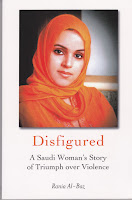Infidel by Ayaan Hirsi Ali (Memoir)
Gertrude Bell, Queen of the Desert, Shaper of Nations by Georgina Howell (Biography)
The life journeys of these four very different women were woven together through similar Arabian settings, Muslim religion, and personal perseverance. Using different genre generated gripping stories of grit and guts in hostile physical and social environments. Through their life stories three of the women, Al-Baz, Hirsi Ali, and Bell, became activists and role models.
The two memoirs spoke in distinct voices: determined and dedicated, raging and rebellious. Al-Baz was the first women to be a Saudi news anchor before her husband savagely beat her into a coma. She was always determined to speak her own mind, but she also stayed dedicated to her Muslim religion, even forgiving her abusive husband. Not so Hirsi Ali who survived brutal beatings as a child, female mutilation and civil wars to renounce the Muslim brotherhood and escape to the Netherlands. Gately’s novel of an American nurse in Afghanistan is none of the above. She does portray the Taliban as ruthless murders, but her prose lacks the vehement and passionate fury of the memoirs. Since Gately was a nurse in Afghanistan perhaps a memoir would have worked better?
And then there’s Gertrude. Truly one of the most amazing women ever: she climbed mountains, explored the desert and served as a dynamic, energetic, and creative force in the creation of Iraq. That’s just the beginning! Born in the late 1800s into a rich, privileged English family her roles also included archaeologist, spy, linguist, author, poet, and photographer.
Each author crafted detailed settings in different Arabian countries of everyday happenings. Al-Baz described suitors coming to her home when she was between the ages of thirteen and twelve. “Every Thursday, the traditional visiting day in Saudi Arabia, a procession of mothers would come to the house taking advantage of the occasion to look at me in detail.” (
Disfigured, p.70)
Hirsi-Ali talks about school, “This itinerant ma’alim was young and ragged, straight from the most rural depths of Somalia. He taught us the Quran the old way. You opened chapter one of the Quran, got your long wooden board, wrote it down it Arabic, learned it by heart in Arabic, recited it by heart, washed the board with reverence because it was now holy and did it again. You did this for two hours, and every mistake earned you a rap on your hands or legs with a thin, sharp, stick.” (
Infidel, p. 74)
Gately invites her reader to dinner in an Afghan home where they spread a bright red vinyl tablecloth on the floor. Howell uses Bell’s own journal to describe Mesopotamia, “The whole world shone like a jewel, green crops, and blue waters and far away the gleaming snows of the mountains that bound Mesopotamia to the north…I considered that the history of Asia was spread out before me.” (
Gertrude Bell, p. 126)
Beyond teaching the reader about the Arab world, more importantly the books demonstrate how each woman became a voice for oppressed women. Bell founded the first girls’ school in Baghdad, raised funds for a women’s hospital, and set up a lecture series for females. Her life was a constant new chapter for doing things differently. When most women of her class were content to be serving tea and their husbands, Bell was sitting in a tent with a sheik or climbing mountains in her underwear. (Totally against what seemed her character, Bell was against women’s suffrage.)
After her horrific beating Al-Baz became part of a French organization, Ni Putes, Ni Soumises, which is committed to change and she says, for Muslim women, “I am a disruptive presence because I give them ideas.” (
Disfigured, p. 157) Even Gately’s character, Elsa, escapes the slums to become an aide nurse, never even conceived for a girl from her neighborhood.
It is Hirsi Ali’s courage, however, which astounds the reader. After escaping depraved oppression she builds a secure life in Holland, but is not content and begins to speak out about all Muslim women’s lack of any rights. She makes a film with Theo vanGoth, a famous Amsterdam filmmaker, called “Submission: Part One,” about the relation of the individual with Allah. VanGoth is killed for his role in producing the film. Hirsi Ali must flee Holland. Hirsi Ali comments. “I need to seek out the other women held captive in the compound of irrationality and superstition and persuade them to take their lives into their own hands.” ( Infidel, p. 349) Don’t we all? Reading books like these loosens the captivity. They open up to their readers women beyond ones ever conceived. There is so much more to learn from their stories: words unspoken, words spoken; worlds closed, worlds open.

 Their enthusiasm and our enjoyment of their happiness continued as we all wrapped in winter clothing to tromp outside in the middle of a snowstorm for sparklers! Shivering and shaking it wasn’t easy for Dad and their uncle to light those pesky sparklers. But it was worth it: Big smiles, delighted cries, and gleaming luminaries blazed in the blizzardy night. We were all participating in family memories to talk about for years ahead. Better than Star Wars any day.
Their enthusiasm and our enjoyment of their happiness continued as we all wrapped in winter clothing to tromp outside in the middle of a snowstorm for sparklers! Shivering and shaking it wasn’t easy for Dad and their uncle to light those pesky sparklers. But it was worth it: Big smiles, delighted cries, and gleaming luminaries blazed in the blizzardy night. We were all participating in family memories to talk about for years ahead. Better than Star Wars any day.










